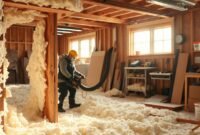Most homeowners are wondering can you burn insulation when you want to remove the old one and replace it with a new one. For many people, burning the old insulation is the simplest way to remove it.
But it’s not that easy. You need to meet a certain guideline if you don’t want to be considered violating the regulations. So, make sure you understand everything before burning it down.
Burn or Not Burn It?
If you ask yourself if can you burn insulation, the answer may vary. Different locations have different regulations and rules. However, most areas have rules concerning different burning requirements and materials. If it’s considered legal to burn the old insulation, you should proceed carefully. But if it’s considered illegal, you must stop.
If it’s considered legal to burn old insulation, ensure that you only burn the insulation in the fire pit or stove, especially if you are sure it’s non-treated. Non-treated means that the insulation doesn’t have any chemical retardants.

But again, do it properly and correctly. Check for laws or regulations about insulation burning, whether legal or illegal.
Here’s the basic guide about burning your insulation:
- Know the details of your insulation. If it has formaldehyde, then you shouldn’t burn it. It would be too dangerous.
- If you have fiberglass insulation, doing it in an open fire is not recommended. It’s because of the many cases of home fires caused by improperly disposed ashes, whether left as piles within the ground levels or left within the trash bags. When it happens, it can cause fires that may last for days or even weeks.
- Moreover, it’s not advisable to burn fiberglass insulation because of the breathing hazard. The fine particles aren’t exactly great for breathing, even when it doesn’t have any chemicals. Imagine the double danger when there is chemicals involved.
- What about cellulose insulation? It’s considered safer to burn, but only after you treat it with borates. Formaldehyde is a no-no.
Read also: Will Fiberglass Insulation Burn?
Is Insulation Safe to Burn?
Although the answer is yes, is insulation basically safe to burn? Here’s the fact: Insulation may not catch fire because of its materials, but it can (and may) melt.
Where there is fire, the flame will slowly spread through the insulation. Insulation is considered non-combustible so that it won’t burn. But again, it can melt. If it happens, it may lead to water damage. Read the previous section about insulation burns and the guidelines.
How to Dispose of Old Insulation
The first thing is to consult the local waste collection agency. They are professionals who know what to do, and they can educate you about the proper disposal. You can consult them about your insulation situation and let them guide you.
In general, here are the steps to do the disposal:
- Choose an area or space with a well-ventilated system. Don’t let anyone near it, whether your kids or pets. Go with a simple and unfurnished room so cleaning up will be easy.
- Don’t forget to wear protective gear, such as long-sleeved shirts and trousers, head covering, goggles, gloves, and dust mask. It’s better to wear old clothes for the process so you can get rid of them afterward.
- Choose contractor bags for the disposal process. Your local waste collection agency can advise you on the proper type of bag.
- Bag the old insulation and then double-bag it.
- Clean the disposal area.
- Take the bags to the local waste collection agency.
Conclusion
Don’t underestimate the proper way to dispose of your insulation. If you are in doubt, talk to a professional who handles everything. Now that you know the answer to can you burn insulation, you can do it correctly.


